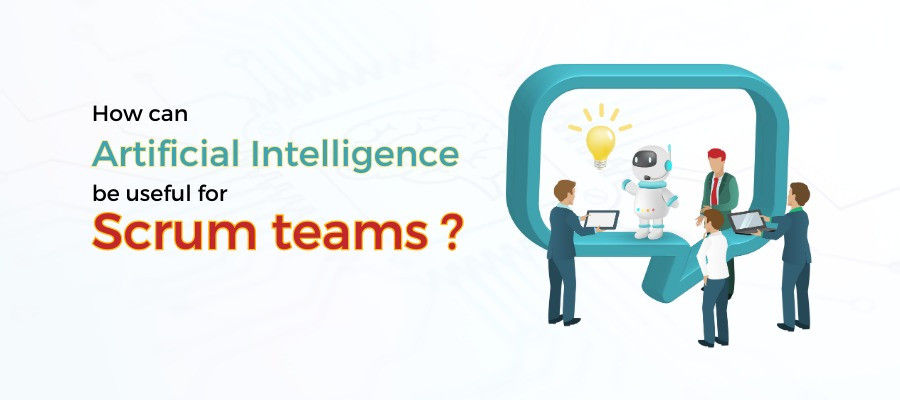How can AI be useful for Scrum teams?

Are you currently using Scrum within an Agile framework to develop products and projects? If you believe that artificial intelligence won't influence your role or can’t make it more seamless, it might be time to think that again.
The impact of AI is pervasive, touching every point of our lives, and the Agile community is no exception. Today, we will have a look at how AI can be useful in Scrum Teams to create a more efficient workplace.
How can AI Help Team for a more Strategic Workflow?
Innovation: AI assists teams in generating novel ideas and solutions. It utilizes natural language generation to craft User Stories or scenarios rooted in user needs or preferences. Additionally, AI employs generative design to produce multiple design options based on predefined criteria or constraints.
Collaboration: AI plays a pivotal role in bolstering collaboration and communication within remote and distributed teams. Through virtual and online tools tailored to support Agile and Scrum practices, AI aids in tasks like creating and tracking User Stories, conducting daily stand-ups, and facilitating retrospectives.
Learning: AI contributes to the Learning process by harnessing machine Learning algorithms to furnish feedback and suggestions derived from data analysis. Moreover, AI leverages reinforcement Learning to adapt its behavior based on the outcomes of its actions, fostering continuous improvement.
Resource Allocation: With AI's assistance, resource allocation can be finely tuned by aligning individuals' skill sets and past performance with the most suitable tasks. This ensures that each task is entrusted to the right person, culminating in heightened efficiency and productivity.
How can AI help a Scrum Team?
Artificial intelligence, including Machine Learning and other advanced techniques, empowers machines to execute tasks that typically require human intelligence, including Learning, reasoning, and problem-solving. In the context of Agile and Scrum Teams, AI offers valuable capabilities to streamline various aspects of the software development process:
Summarize Long Meetings
AI can play a pivotal role in enhancing the quality and productivity of meetings, ensuring that unproductive discussions do not bog down Agile Teams. AI takes on the responsibility of managing progress updates and summarizing data, allowing teams to channel their efforts toward more strategic and creative discussions during meetings. This transformation not only boosts team morale but also cultivates a collaborative and innovative project environment.
When it comes to AI-powered meeting solutions, alternatives to Otter are making significant strides. In essence, AI is revolutionizing the landscape of team collaboration and communication within Agile project management. By seamlessly integrating AI into their workflows, Scrum Masters empower their teams to operate with greater efficiency, stay well-informed, and remain laser-focused on delivering exceptional results.
Sprint Planning
AI can enhance the accuracy of Sprint Planning by leveraging Machine Learning algorithms that analyze past sprint data. Predictions regarding task duration can be refined based on factors like complexity, team size, skill sets, and availability. This enables teams to optimize their resource allocation and accelerate value delivery.
Backlog Prioritization
AI facilitates efficient backlog prioritization by employing natural language processing to extract critical information from User Stories and acceptance criteria. Sentiment analysis can gauge customer satisfaction, and data-driven analytics can rank backlog items based on their value, urgency, and impact.
Risk Assessment
AI aids teams in assessing project risks through the analysis of project metrics, user feedback, market trends, and anomaly detection. It provides suggestions or automated resolutions and offers insights and recommendations on risk mitigation strategies.
Integrating AI into Agile and Scrum practices can enhance efficiency, decision-making, and overall project success, ultimately benefiting both teams and stakeholders in the software development process.
Project Planning
Project planning, particularly the phases of project definition and planning, has historically been a time-consuming, repetitive, and predominantly manual process. However, the advent of Machine Learning (ML), natural language processing (NLP), and large language models (LLMs) like ChatGPT is ushering in a transformative shift.
LLMs simplify the task of flushing out User Stories and detecting ambiguities or omissions within project plans. While LLM outputs may not be flawless, they are capable of alleviating a substantial portion, up to 80%, of the arduous work typically associated with project planning. This technological advancement streamlines and accelerates the project management process, offering teams greater efficiency and precision in their planning endeavors.
Best AI Tools for Enhanced Efficiency and Productivity
Monday.com: This platform offers a simplified approach to task management for various project types, giving transparency within your team's work culture.
HiveMind: HiveMind stands as a real-time AI assistant, capable of tasks such as content creation, project planning, workflow optimization, email responses, and more.
Forecast: Utilizing machine Learning, Forecast automates essential functions, including scheduling, budgeting, resource allocation, and risk assessment. It further enhances decision-making with data-driven insights and recommendations.
Zoho Projects: Zoho Projects empowers teams in handling tasks, milestones, documents, reports, and more. Additionally, Zoho's AI assistant, Zia, offers intelligent suggestions, reminders, and alerts for enhanced productivity.
Clarizen: As an enterprise-grade project management solution, Clarizen employs AI to optimize workflows, streamline processes, and facilitate collaboration. Teams benefit from improved goal alignment, progress tracking, and effective communication. Furthermore, Clarizen leverages Einstein Analytics, Salesforce's AI platform, to deliver actionable insights and predictive capabilities.
Conclusion
In 2023, Scrum tools have become significantly reliant on AI algorithms. Scrum Teams can really foster a whole new level of efficiency in the work environment using AI platforms and tools. The advanced tools and features introduce novel capabilities to projects and teams, which can lead to over 10x efficiency.
Ref link:



